
pointer
An exploratory AI desktop app featuring object trees, crosstabs, and chat trees for deep conversation analysis. Seamlessly import your chat history from OpenAI & DeepSeek. 一款探索性 AI 桌面应用,集成对象树、交叉表和聊天树,追求极致的AI对话体验。支持从 OpenAI 和 DeepSeek 无缝导入聊天记录。
Stars: 86
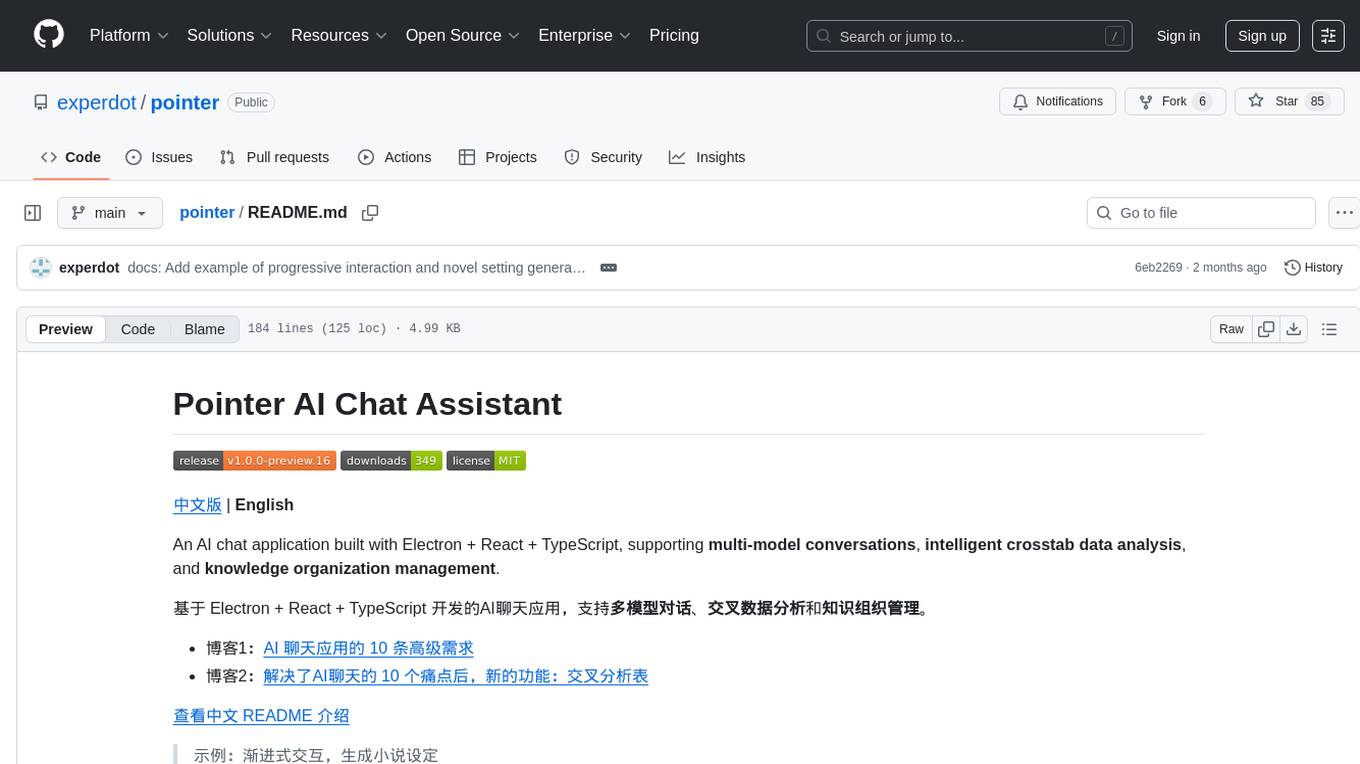
Pointer is a lightweight and efficient tool for analyzing and visualizing data structures in C and C++ programs. It provides a user-friendly interface to track memory allocations, pointer references, and data structures, helping developers to identify memory leaks, pointer errors, and optimize memory usage. With Pointer, users can easily navigate through complex data structures, visualize memory layouts, and debug pointer-related issues in their codebase. The tool offers interactive features such as memory snapshots, pointer tracking, and memory visualization, making it a valuable asset for C and C++ developers working on memory-intensive applications.
README:
中文版 | English
An AI chat application built with Electron + React + TypeScript, supporting multi-model conversations, intelligent crosstab data analysis, and knowledge organization management.
基于 Electron + React + TypeScript 开发的AI聊天应用,支持多模型对话、交叉数据分析和知识组织管理。
示例:渐进式交互,生成小说设定
- Support for multiple AI models (OpenAI GPT, Claude, DeepSeek, etc.)
- Streaming conversation responses with reasoning process display
- Message tree branch management with conversation version control
- Hierarchical chat history organization with parallel tab workflow
- Global content search with keyword highlighting
- Global AI generation task management with task monitoring and cancellation
- Global Q&A traceability mechanism to track generation relationships across pages
- AI Crosstab Analysis: Automatically generate structured comparison analysis tables
- AI Object Manager: Visual knowledge data structure management
- Data Import/Export: Support for mainstream AI platform data migration (OpenAI ChatGPT / Deepseek Chat)
- Folder hierarchical organization
- Message bookmarking and tagging
- Batch operations and drag-and-drop sorting
- Data backup and recovery
- Node.js 18+
- Windows 10+, macOS 10.15+, or Linux
# Install dependencies
pnpm install
# Development mode
pnpm dev
# Build application
pnpm build:win # Windows
pnpm build:mac # macOS
pnpm build:linux # Linux- Launch the application and go to settings
- Configure AI model parameters:
- Configuration name
- API endpoint
- Access key
- Model identifier
- Select default model and test connection
Convert any topic into structured comparison analysis tables, suitable for:
- Academic research literature comparison
- Business decision solution evaluation
- Educational material knowledge organization
- Product feature competitive analysis
Workflow:
- Input analysis topic
- AI automatically generates table structure
- Fill intersection data
- Manual editing and optimization
Visualize complex data structures with support for:
- Tree structure display
- AI automatic node generation
- Manual editing and organization
- Structured data export
- Message tree structure
- Independent conversations between branches
- Historical version switching
- Context inheritance
- Frontend: React 19 + TypeScript + Ant Design
- Backend: Electron main process
- Build: Vite + Electron Builder
- Styling: CSS Modules + SCSS
src/
├── main/ # Electron main process
├── renderer/ # Renderer process
│ ├── components/ # React components
│ ├── store/ # State management
│ ├── services/ # Business logic
│ └── utils/ # Utility functions
└── preload/ # Preload scripts
-
react-markdown: Markdown rendering -
mermaid: Chart drawing -
katex: Mathematical formulas -
html2canvas: Screenshot functionality -
rehype-highlight: Code highlighting
Education & Research: Course design, knowledge organization, literature analysis
Business Analysis: Market research, competitive comparison, strategic planning
Content Creation: Topic planning, material organization, structured writing
Personal Learning: Note organization, knowledge comparison, review materials
- Fork the project and create a feature branch
- Follow TypeScript and ESLint standards
- Submit code and create Pull Request
- Use functional components and Hooks
- Follow conventional commits format
- Maintain type safety
- Bug fixes
- Generation prompt and context optimization
- Performance optimization and user experience improvement
MIT License - See LICENSE file for details
For Tasks:
Click tags to check more tools for each tasksFor Jobs:
Alternative AI tools for pointer
Similar Open Source Tools

pointer
Pointer is a lightweight and efficient tool for analyzing and visualizing data structures in C and C++ programs. It provides a user-friendly interface to track memory allocations, pointer references, and data structures, helping developers to identify memory leaks, pointer errors, and optimize memory usage. With Pointer, users can easily navigate through complex data structures, visualize memory layouts, and debug pointer-related issues in their codebase. The tool offers interactive features such as memory snapshots, pointer tracking, and memory visualization, making it a valuable asset for C and C++ developers working on memory-intensive applications.
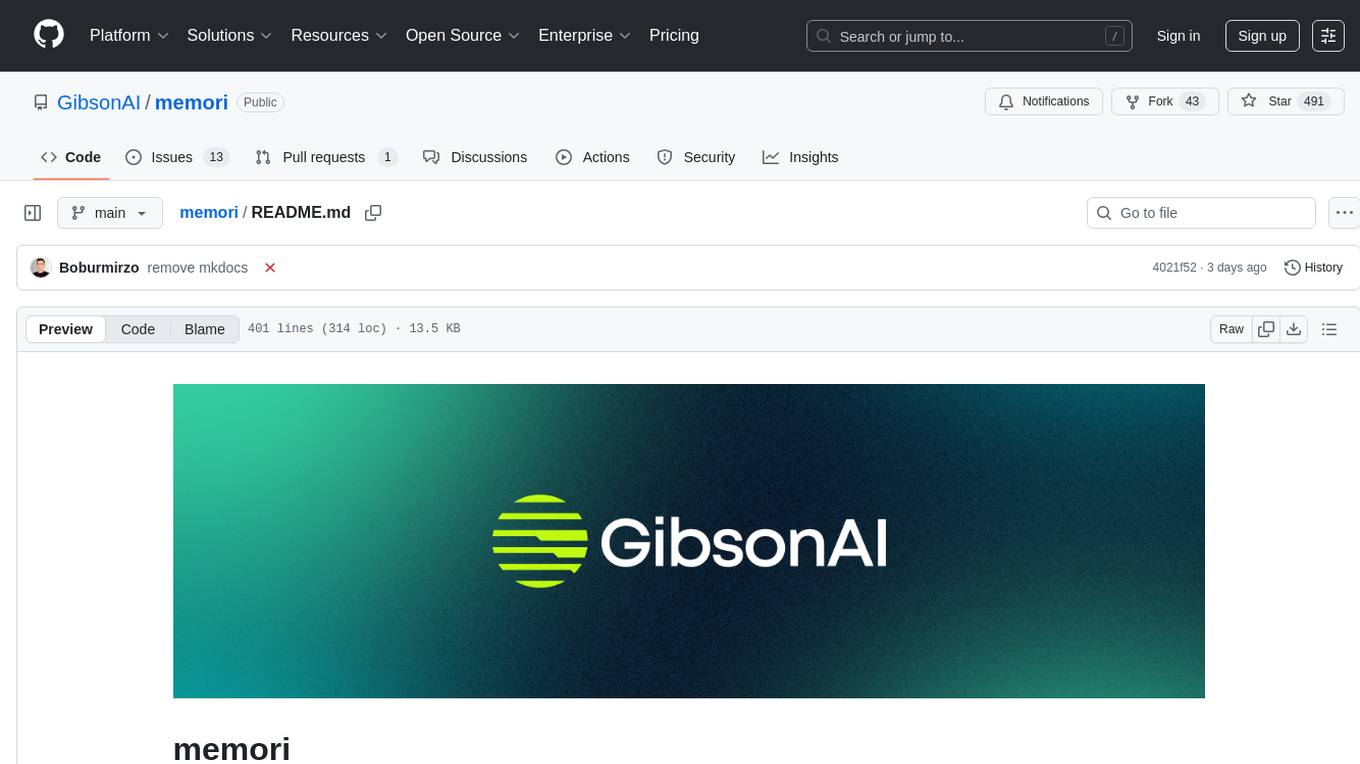
memori
Memori is a lightweight and user-friendly memory management tool for developers. It helps in tracking memory usage, detecting memory leaks, and optimizing memory allocation in software projects. With Memori, developers can easily monitor and analyze memory consumption to improve the performance and stability of their applications. The tool provides detailed insights into memory usage patterns and helps in identifying areas for optimization. Memori is designed to be easy to integrate into existing projects and offers a simple yet powerful interface for managing memory resources effectively.
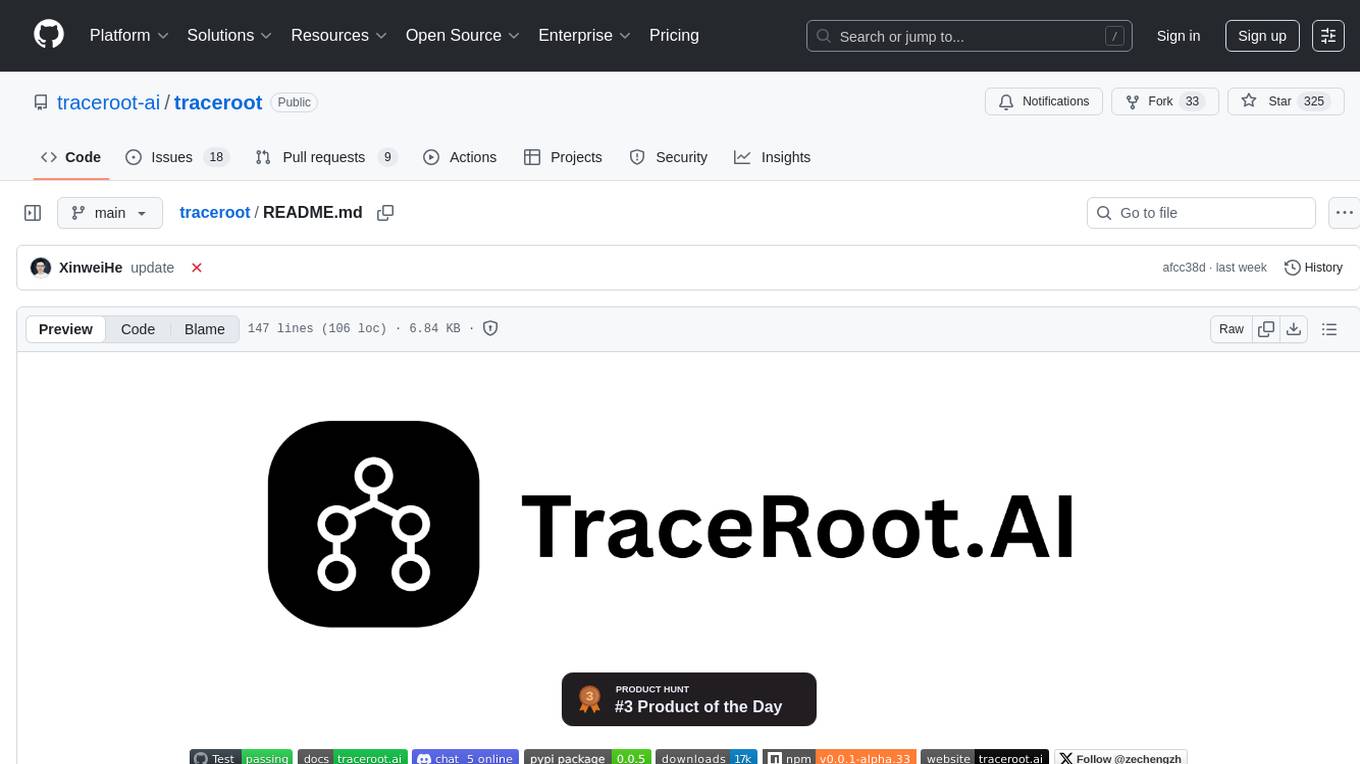
traceroot
TraceRoot is a tool that helps engineers debug production issues 10× faster using AI-powered analysis of traces, logs, and code context. It accelerates the debugging process with AI-powered insights, integrates seamlessly into the development workflow, provides real-time trace and log analysis, code context understanding, and intelligent assistance. Features include ease of use, LLM flexibility, distributed services, AI debugging interface, and integration support. Users can get started with TraceRoot Cloud for a 7-day trial or self-host the tool. SDKs are available for Python and JavaScript/TypeScript.
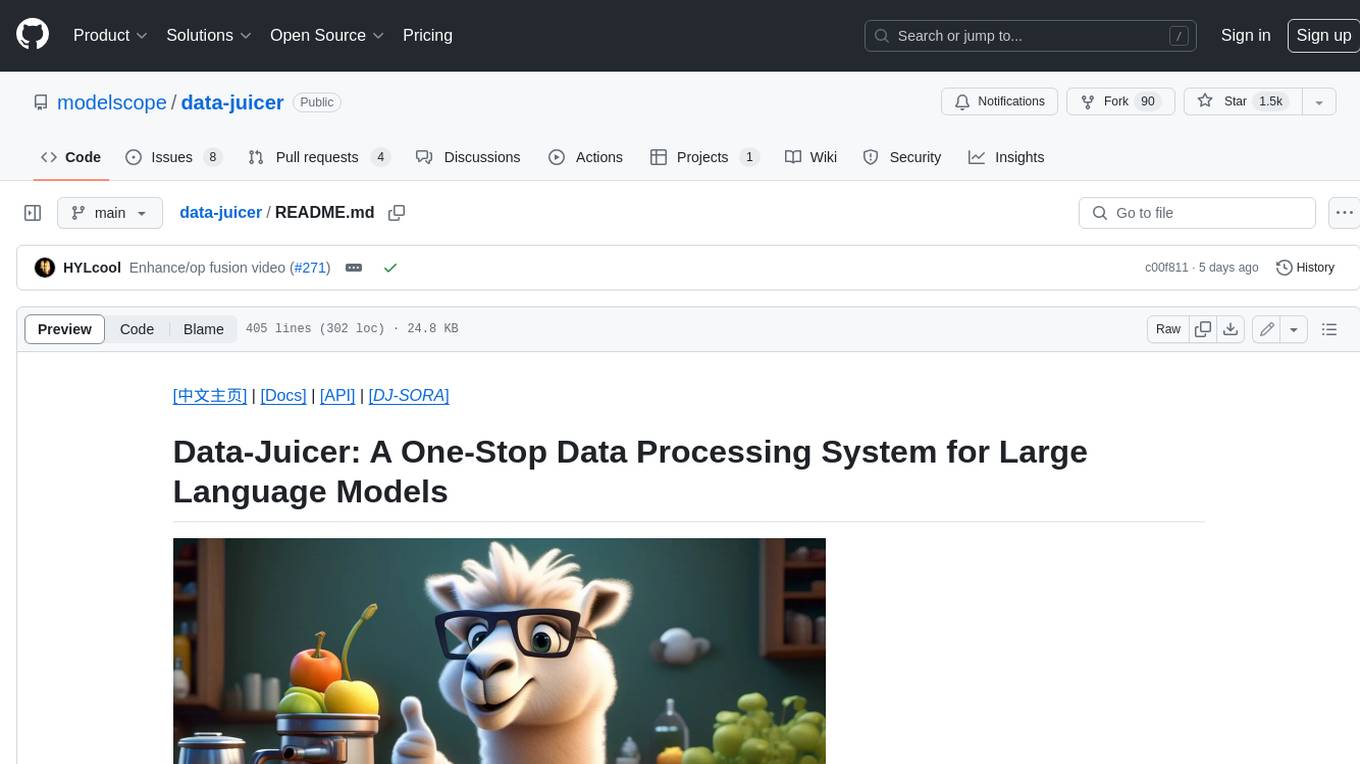
data-juicer
Data-Juicer is a one-stop data processing system to make data higher-quality, juicier, and more digestible for LLMs. It is a systematic & reusable library of 80+ core OPs, 20+ reusable config recipes, and 20+ feature-rich dedicated toolkits, designed to function independently of specific LLM datasets and processing pipelines. Data-Juicer allows detailed data analyses with an automated report generation feature for a deeper understanding of your dataset. Coupled with multi-dimension automatic evaluation capabilities, it supports a timely feedback loop at multiple stages in the LLM development process. Data-Juicer offers tens of pre-built data processing recipes for pre-training, fine-tuning, en, zh, and more scenarios. It provides a speedy data processing pipeline requiring less memory and CPU usage, optimized for maximum productivity. Data-Juicer is flexible & extensible, accommodating most types of data formats and allowing flexible combinations of OPs. It is designed for simplicity, with comprehensive documentation, easy start guides and demo configs, and intuitive configuration with simple adding/removing OPs from existing configs.
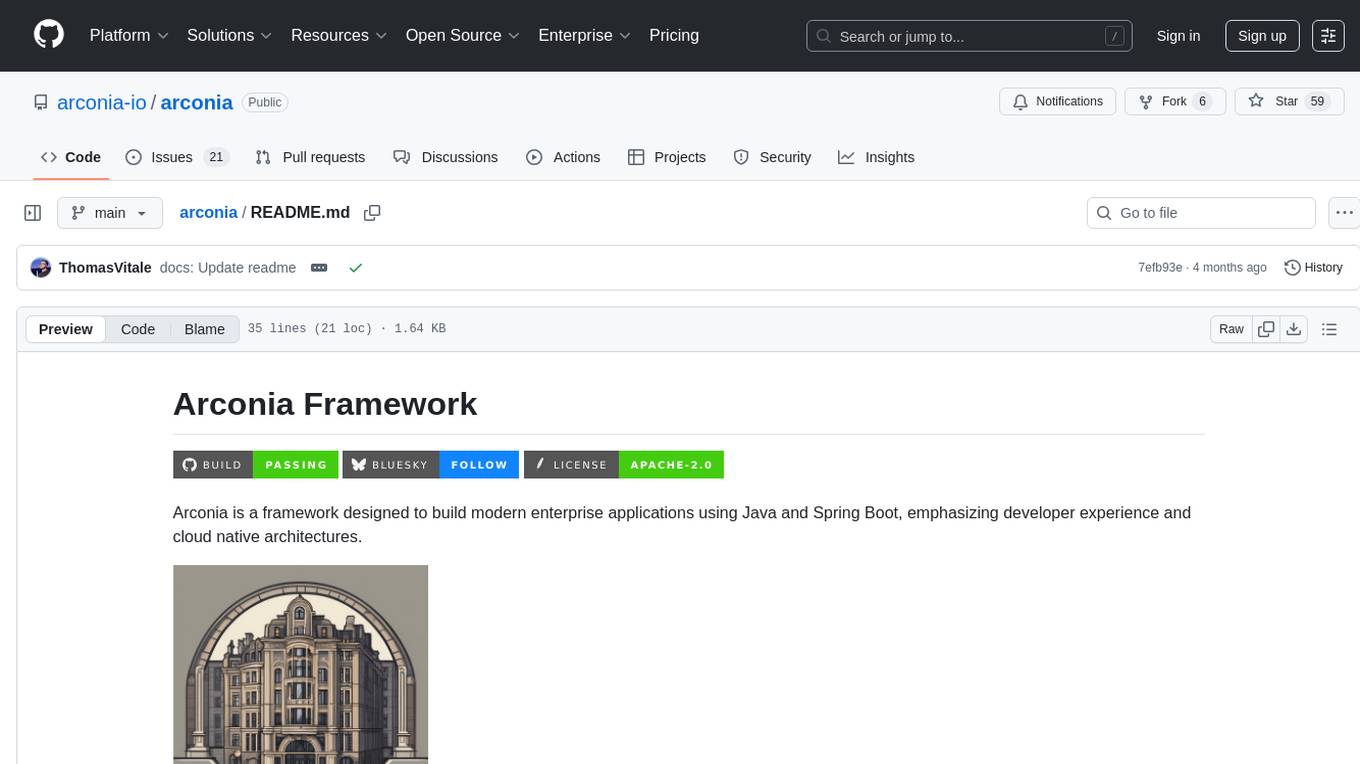
arconia
Arconia is a powerful open-source tool for managing and visualizing data in a user-friendly way. It provides a seamless experience for data analysts and scientists to explore, clean, and analyze datasets efficiently. With its intuitive interface and robust features, Arconia simplifies the process of data manipulation and visualization, making it an essential tool for anyone working with data.
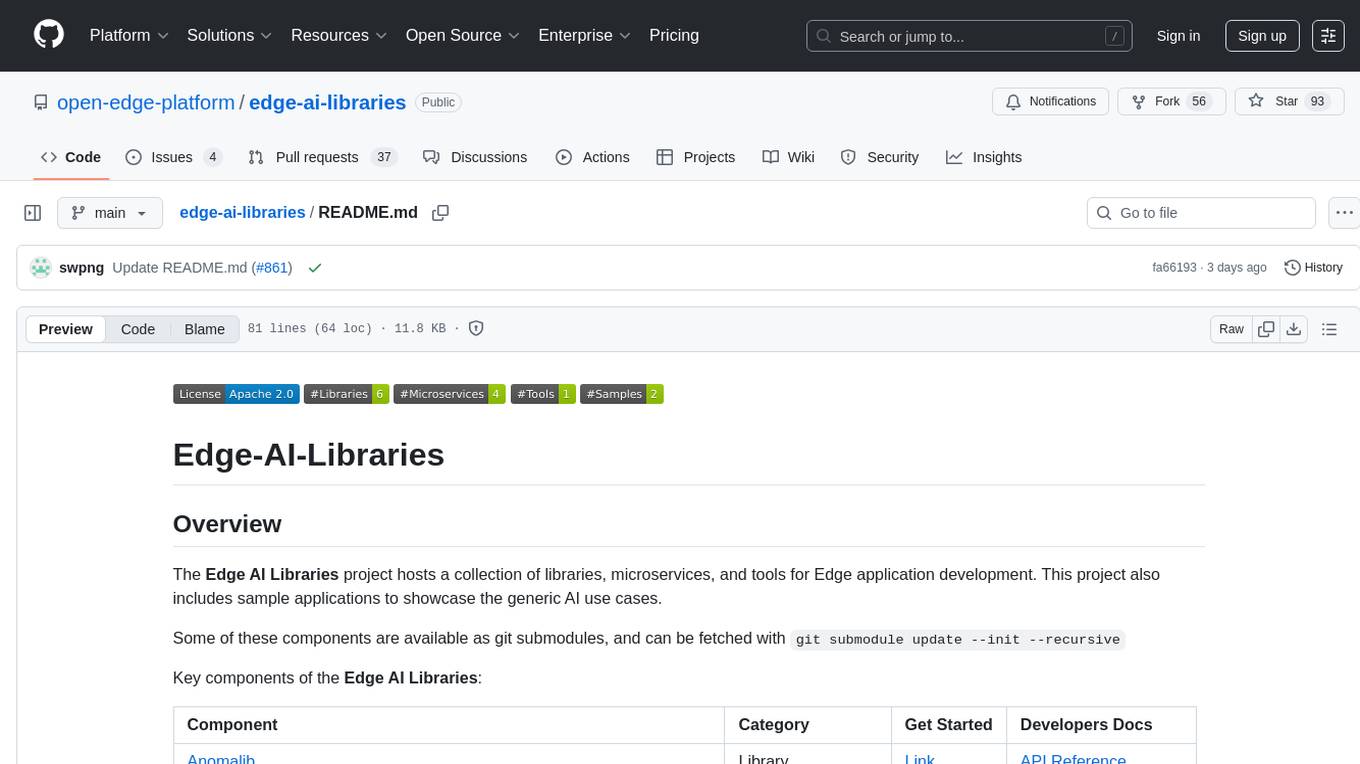
edge-ai-libraries
The Edge AI Libraries project is a collection of libraries, microservices, and tools for Edge application development. It includes sample applications showcasing generic AI use cases. Key components include Anomalib, Dataset Management Framework, Deep Learning Streamer, ECAT EnableKit, EtherCAT Masterstack, FLANN, OpenVINO toolkit, Audio Analyzer, ORB Extractor, PCL, PLCopen Servo, Real-time Data Agent, RTmotion, Audio Intelligence, Deep Learning Streamer Pipeline Server, Document Ingestion, Model Registry, Multimodal Embedding Serving, Time Series Analytics, Vector Retriever, Visual-Data Preparation, VLM Inference Serving, Intel Geti, Intel SceneScape, Visual Pipeline and Platform Evaluation Tool, Chat Question and Answer, Document Summarization, PLCopen Benchmark, PLCopen Databus, Video Search and Summarization, Isolation Forest Classifier, Random Forest Microservices. Visit sub-directories for instructions and guides.

databerry
Chaindesk is a no-code platform that allows users to easily set up a semantic search system for personal data without technical knowledge. It supports loading data from various sources such as raw text, web pages, files (Word, Excel, PowerPoint, PDF, Markdown, Plain Text), and upcoming support for web sites, Notion, and Airtable. The platform offers a user-friendly interface for managing datastores, querying data via a secure API endpoint, and auto-generating ChatGPT Plugins for each datastore. Chaindesk utilizes a Vector Database (Qdrant), Openai's text-embedding-ada-002 for embeddings, and has a chunk size of 1024 tokens. The technology stack includes Next.js, Joy UI, LangchainJS, PostgreSQL, Prisma, and Qdrant, inspired by the ChatGPT Retrieval Plugin.
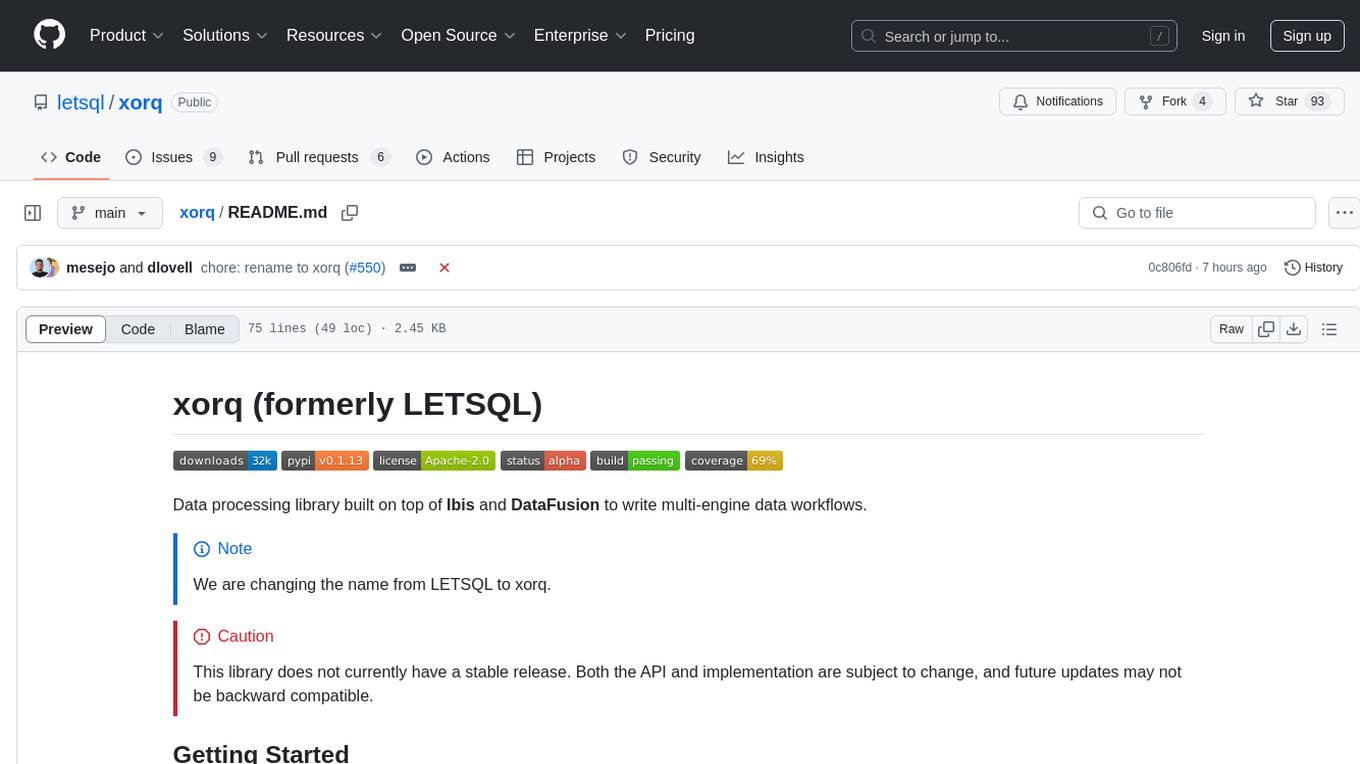
xorq
Xorq (formerly LETSQL) is a data processing library built on top of Ibis and DataFusion to write multi-engine data workflows. It provides a flexible and powerful tool for processing and analyzing data from various sources, enabling users to create complex data pipelines and perform advanced data transformations.
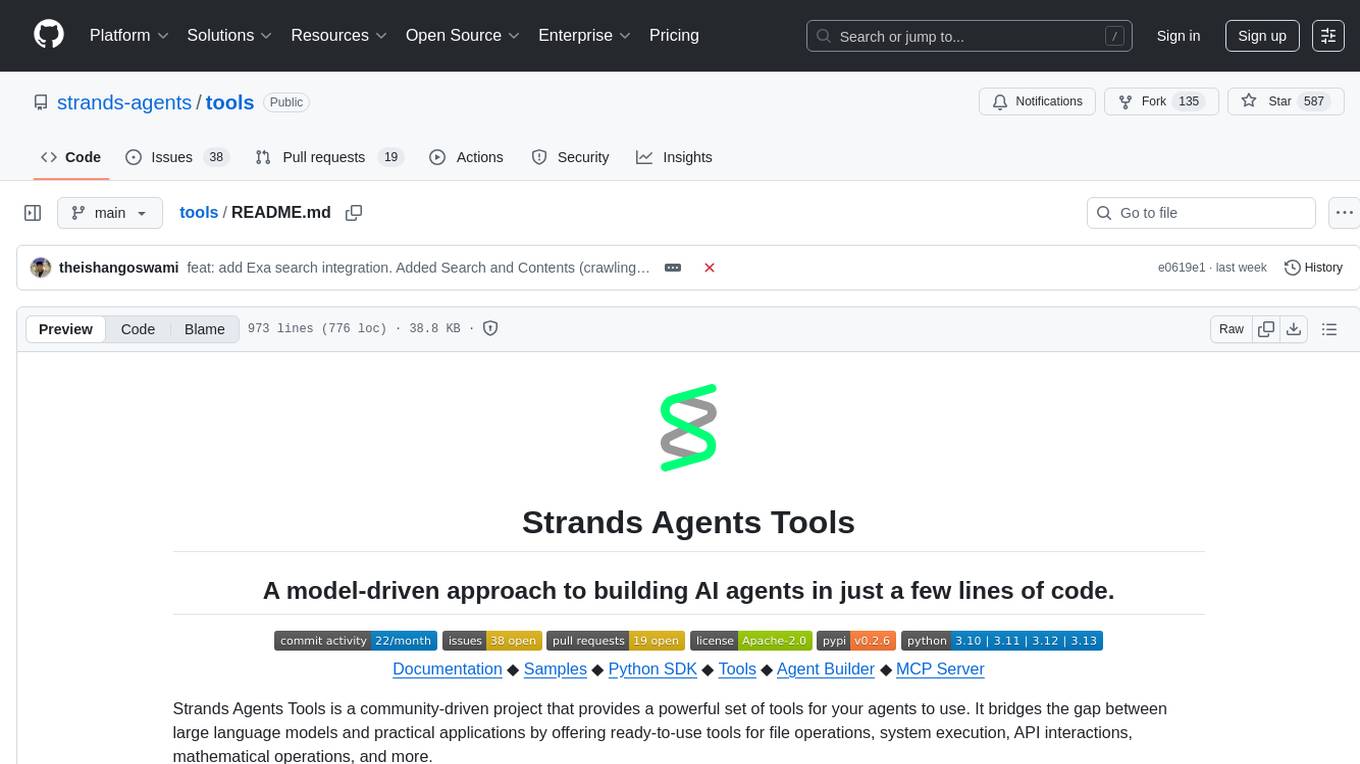
tools
Strands Agents Tools is a community-driven project that provides a powerful set of tools for your agents to use. It bridges the gap between large language models and practical applications by offering ready-to-use tools for file operations, system execution, API interactions, mathematical operations, and more. The tools cover a wide range of functionalities including file operations, shell integration, memory storage, web infrastructure, HTTP client, Slack client, Python execution, mathematical tools, AWS integration, image and video processing, audio output, environment management, task scheduling, advanced reasoning, swarm intelligence, dynamic MCP client, parallel tool execution, browser automation, diagram creation, RSS feed management, and computer automation.
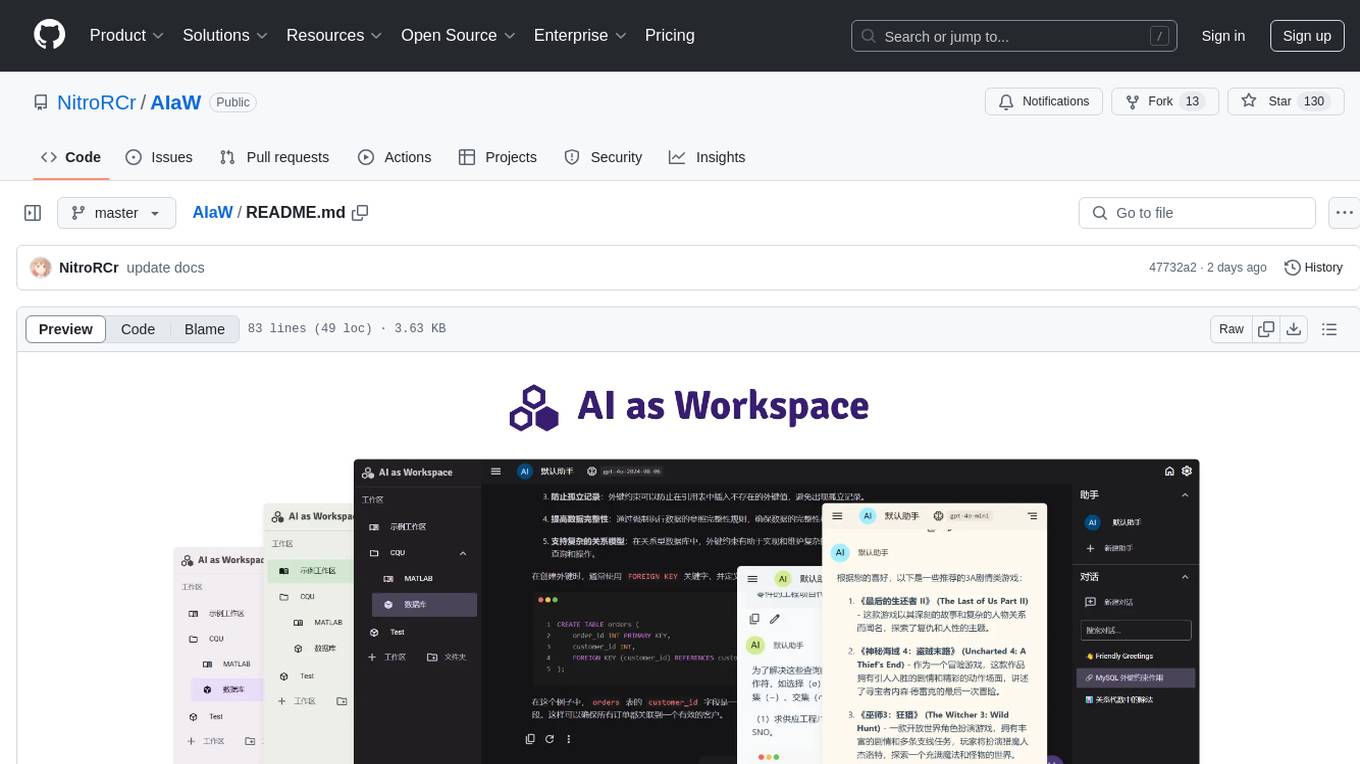
AIaW
AIaW is a next-generation LLM client with full functionality, lightweight, and extensible. It supports various basic functions such as streaming transfer, image uploading, and latex formulas. The tool is cross-platform with a responsive interface design. It supports multiple service providers like OpenAI, Anthropic, and Google. Users can modify questions, regenerate in a forked manner, and visualize conversations in a tree structure. Additionally, it offers features like file parsing, video parsing, plugin system, assistant market, local storage with real-time cloud sync, and customizable interface themes. Users can create multiple workspaces, use dynamic prompt word variables, extend plugins, and benefit from detailed design elements like real-time content preview, optimized code pasting, and support for various file types.
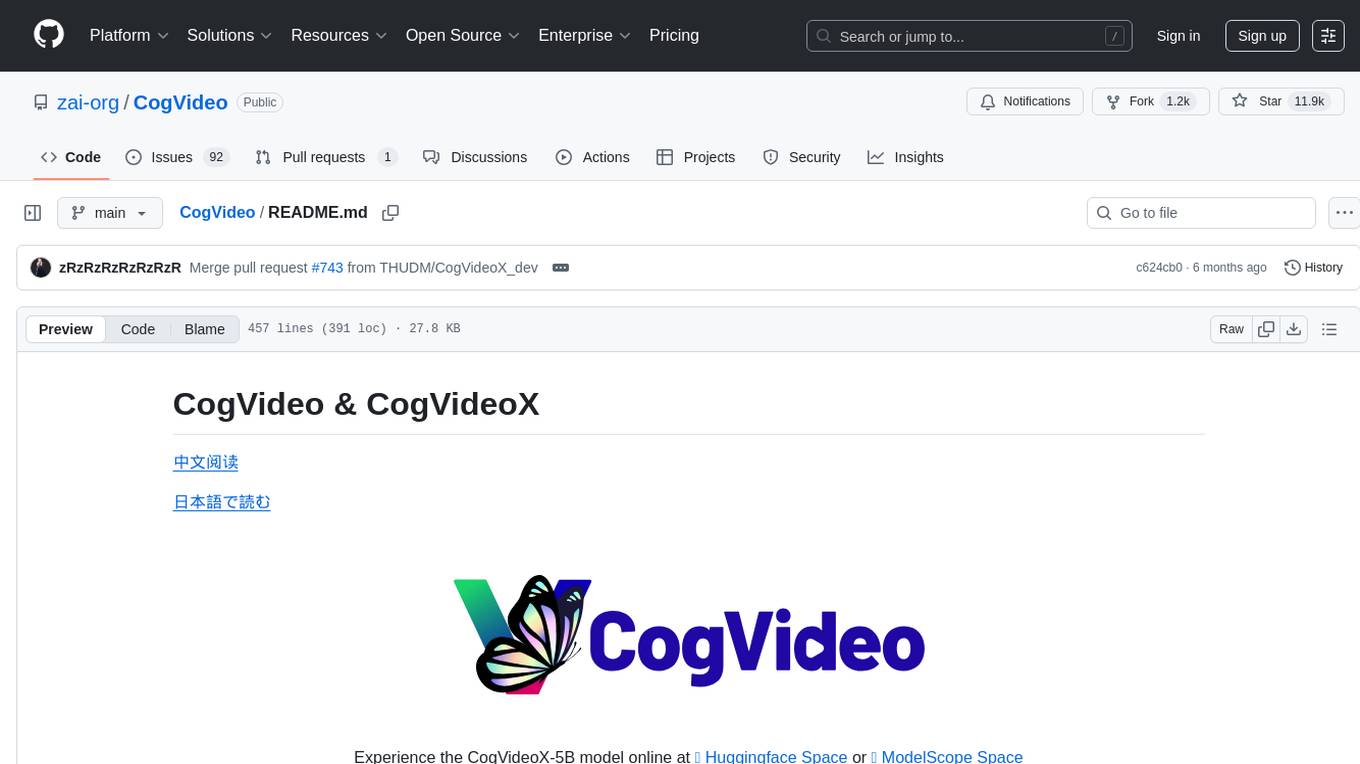
CogVideo
CogVideo is a Python library for analyzing and processing video data. It provides functionalities for video segmentation, object detection, and tracking. With CogVideo, users can extract meaningful information from video streams, enabling applications in computer vision, surveillance, and video analytics. The library is designed to be user-friendly and efficient, making it suitable for both research and industrial projects.

llm
The 'llm' package for Emacs provides an interface for interacting with Large Language Models (LLMs). It abstracts functionality to a higher level, concealing API variations and ensuring compatibility with various LLMs. Users can set up providers like OpenAI, Gemini, Vertex, Claude, Ollama, GPT4All, and a fake client for testing. The package allows for chat interactions, embeddings, token counting, and function calling. It also offers advanced prompt creation and logging capabilities. Users can handle conversations, create prompts with placeholders, and contribute by creating providers.
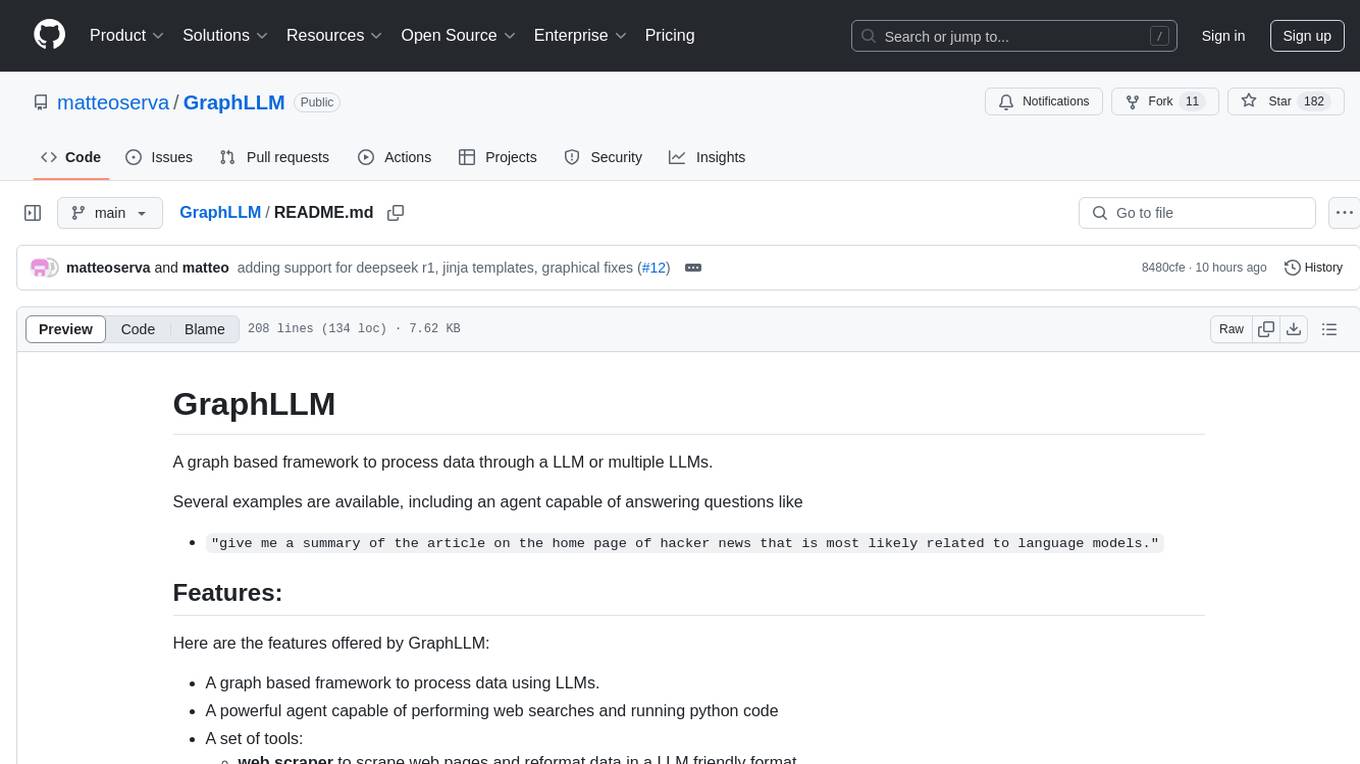
GraphLLM
GraphLLM is a graph-based framework designed to process data using LLMs. It offers a set of tools including a web scraper, PDF parser, YouTube subtitles downloader, Python sandbox, and TTS engine. The framework provides a GUI for building and debugging graphs with advanced features like loops, conditionals, parallel execution, streaming of results, hierarchical graphs, external tool integration, and dynamic scheduling. GraphLLM is a low-level framework that gives users full control over the raw prompt and output of models, with a steeper learning curve. It is tested with llama70b and qwen 32b, under heavy development with breaking changes expected.
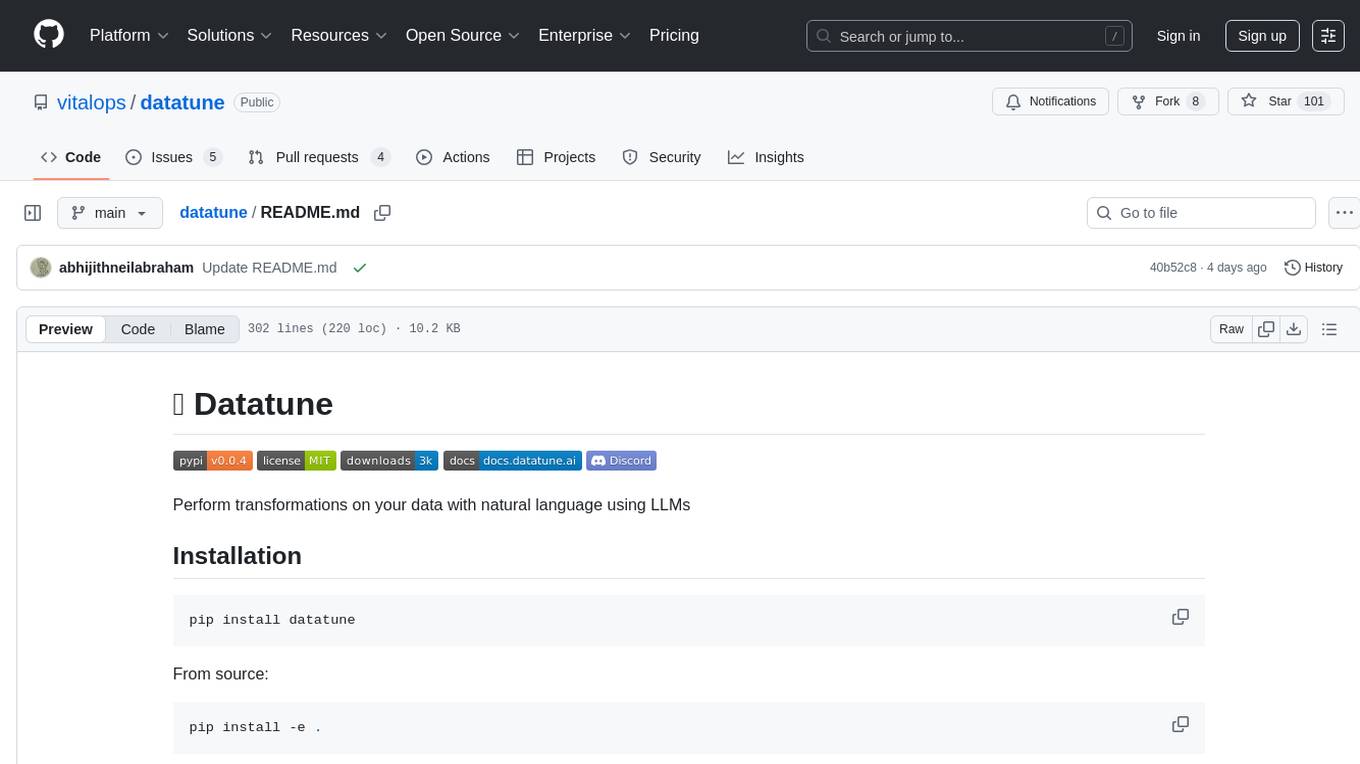
datatune
Datatune is a data analysis tool designed to help users explore and analyze datasets efficiently. It provides a user-friendly interface for importing, cleaning, visualizing, and modeling data. With Datatune, users can easily perform tasks such as data preprocessing, feature engineering, model selection, and evaluation. The tool offers a variety of statistical and machine learning algorithms to support data analysis tasks. Whether you are a data scientist, analyst, or researcher, Datatune can streamline your data analysis workflow and help you derive valuable insights from your data.
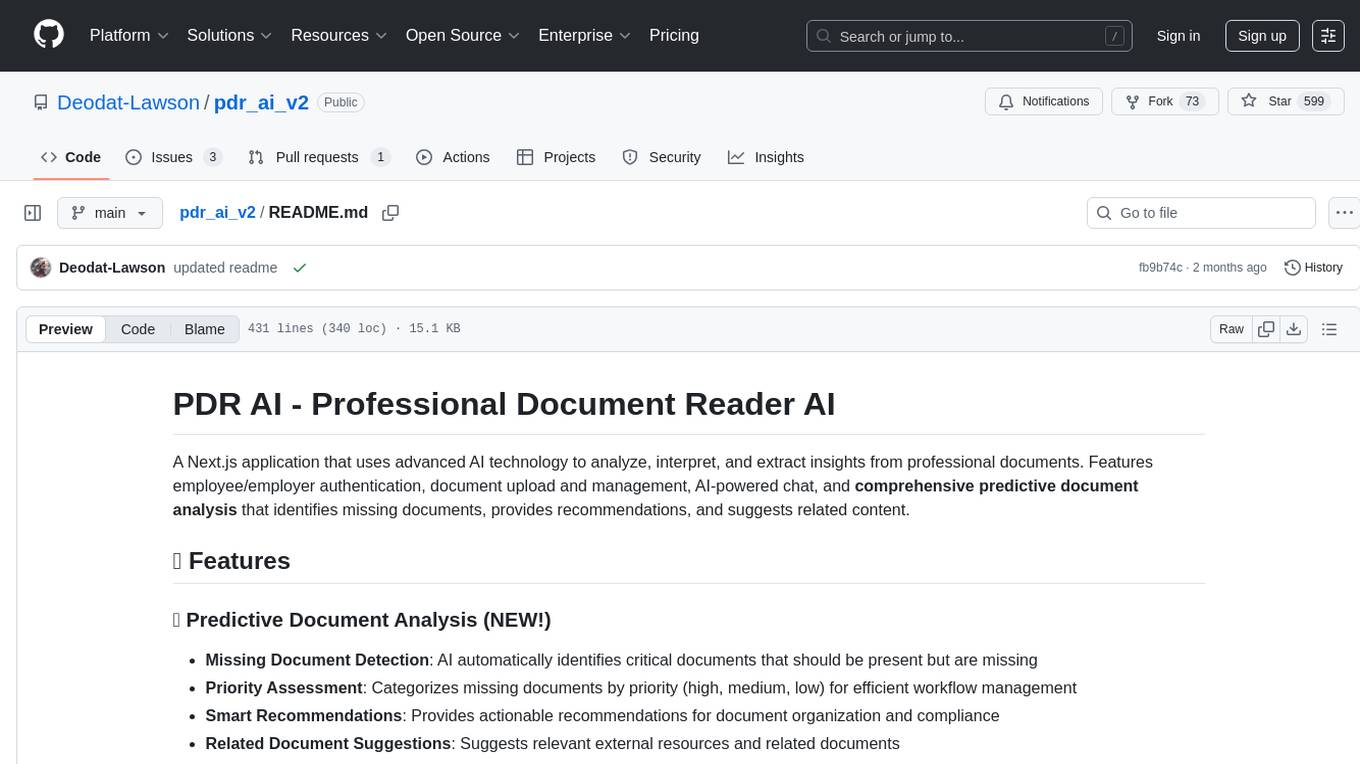
pdr_ai_v2
pdr_ai_v2 is a Python library for implementing machine learning algorithms and models. It provides a wide range of tools and functionalities for data preprocessing, model training, evaluation, and deployment. The library is designed to be user-friendly and efficient, making it suitable for both beginners and experienced data scientists. With pdr_ai_v2, users can easily build and deploy machine learning models for various applications, such as classification, regression, clustering, and more.
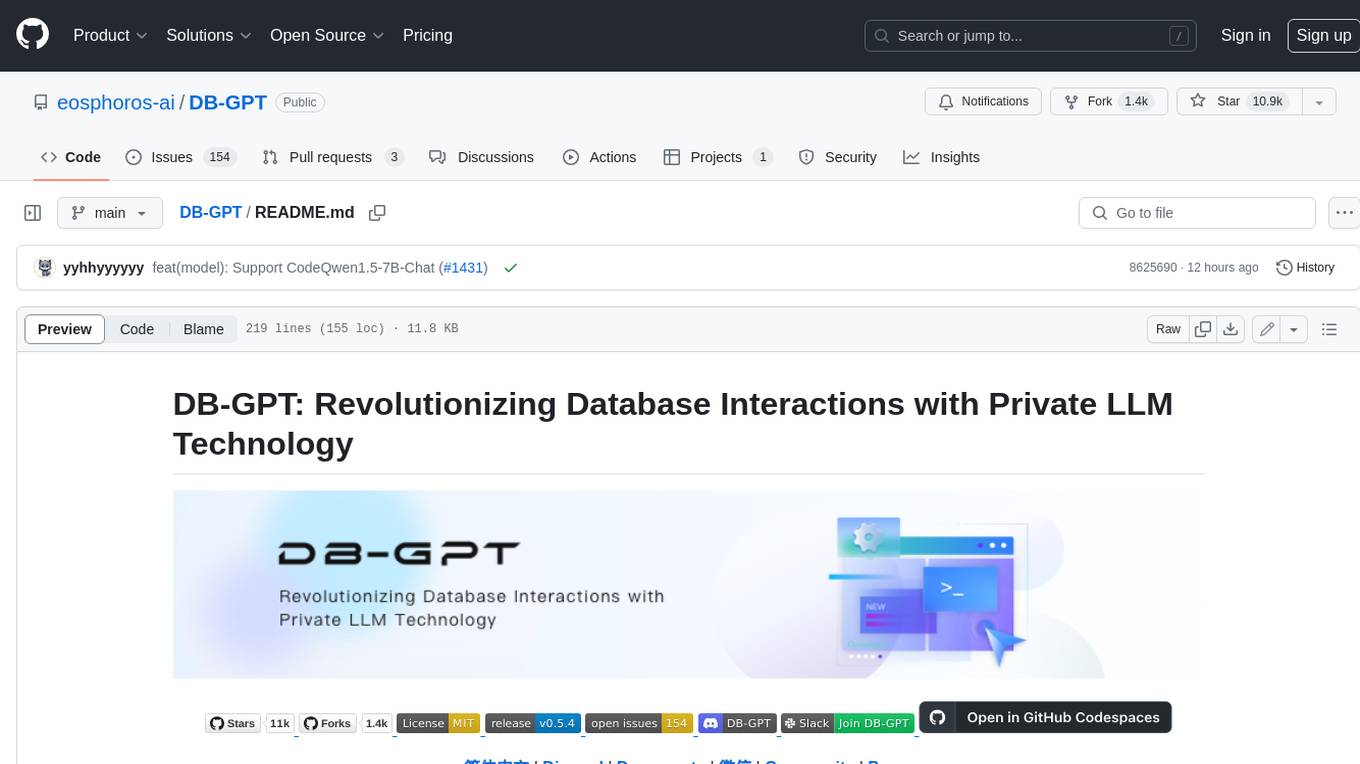
DB-GPT
DB-GPT is an open source AI native data app development framework with AWEL(Agentic Workflow Expression Language) and agents. It aims to build infrastructure in the field of large models, through the development of multiple technical capabilities such as multi-model management (SMMF), Text2SQL effect optimization, RAG framework and optimization, Multi-Agents framework collaboration, AWEL (agent workflow orchestration), etc. Which makes large model applications with data simpler and more convenient.
For similar tasks

pointer
Pointer is a lightweight and efficient tool for analyzing and visualizing data structures in C and C++ programs. It provides a user-friendly interface to track memory allocations, pointer references, and data structures, helping developers to identify memory leaks, pointer errors, and optimize memory usage. With Pointer, users can easily navigate through complex data structures, visualize memory layouts, and debug pointer-related issues in their codebase. The tool offers interactive features such as memory snapshots, pointer tracking, and memory visualization, making it a valuable asset for C and C++ developers working on memory-intensive applications.
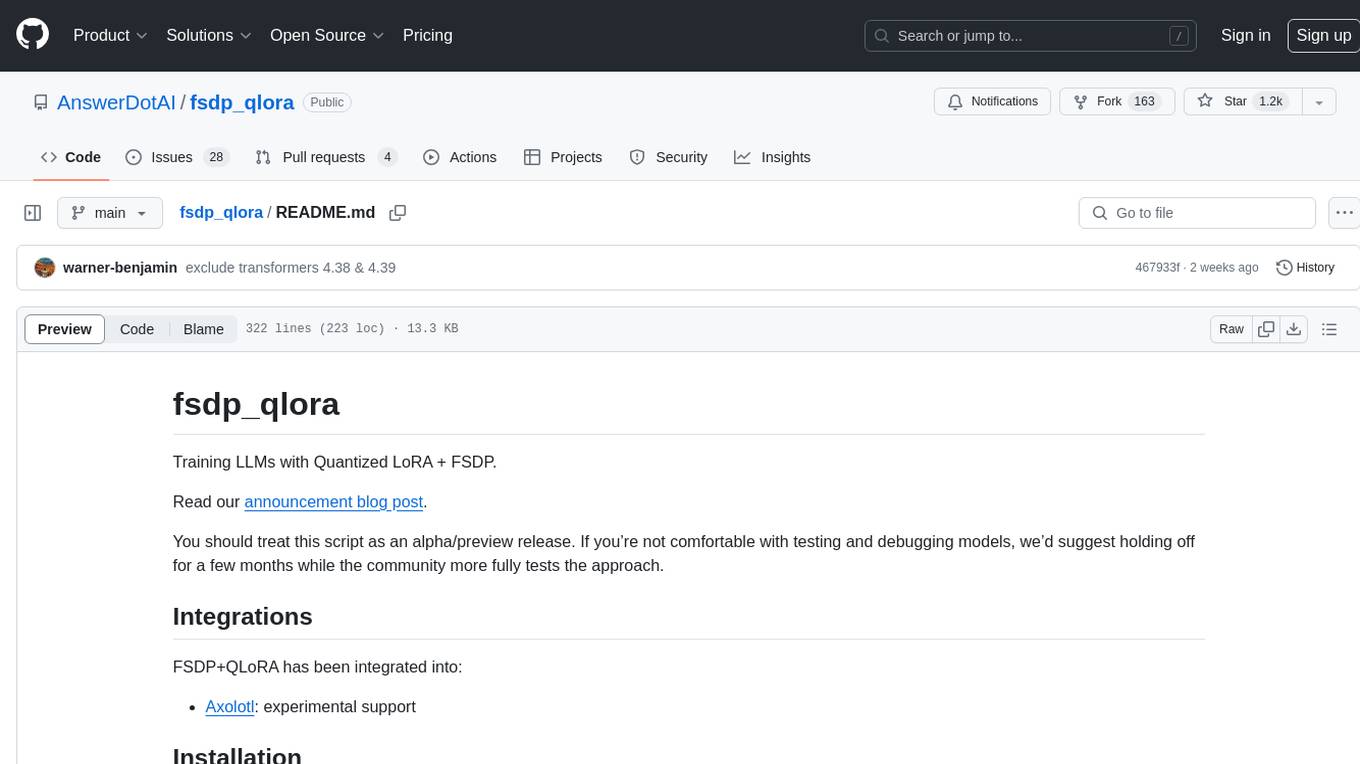
fsdp_qlora
The fsdp_qlora repository provides a script for training Large Language Models (LLMs) with Quantized LoRA and Fully Sharded Data Parallelism (FSDP). It integrates FSDP+QLoRA into the Axolotl platform and offers installation instructions for dependencies like llama-recipes, fastcore, and PyTorch. Users can finetune Llama-2 70B on Dual 24GB GPUs using the provided command. The script supports various training options including full params fine-tuning, LoRA fine-tuning, custom LoRA fine-tuning, quantized LoRA fine-tuning, and more. It also discusses low memory loading, mixed precision training, and comparisons to existing trainers. The repository addresses limitations and provides examples for training with different configurations, including BnB QLoRA and HQQ QLoRA. Additionally, it offers SLURM training support and instructions for adding support for a new model.
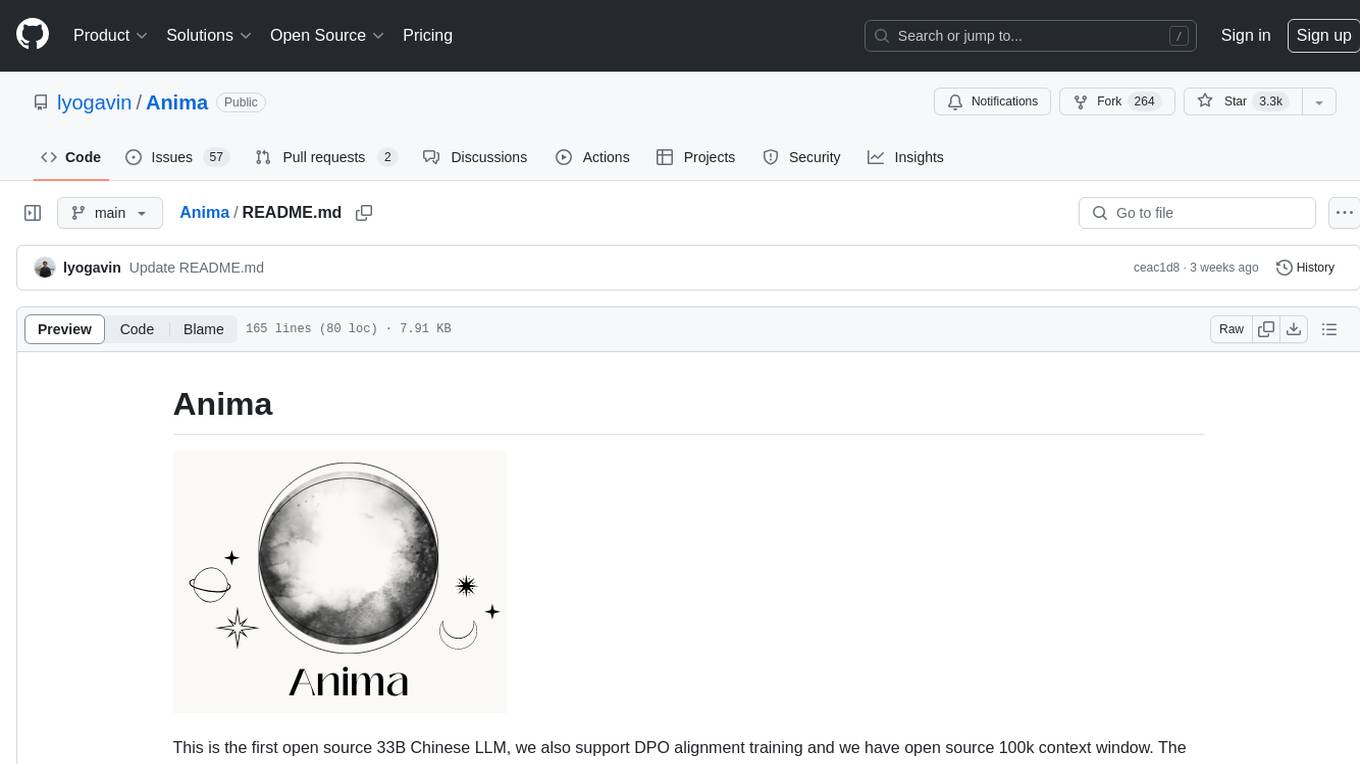
Anima
Anima is the first open-source 33B Chinese large language model based on QLoRA, supporting DPO alignment training and open-sourcing a 100k context window model. The latest update includes AirLLM, a library that enables inference of 70B LLM from a single GPU with just 4GB memory. The tool optimizes memory usage for inference, allowing large language models to run on a single 4GB GPU without the need for quantization or other compression techniques. Anima aims to democratize AI by making advanced models accessible to everyone and contributing to the historical process of AI democratization.
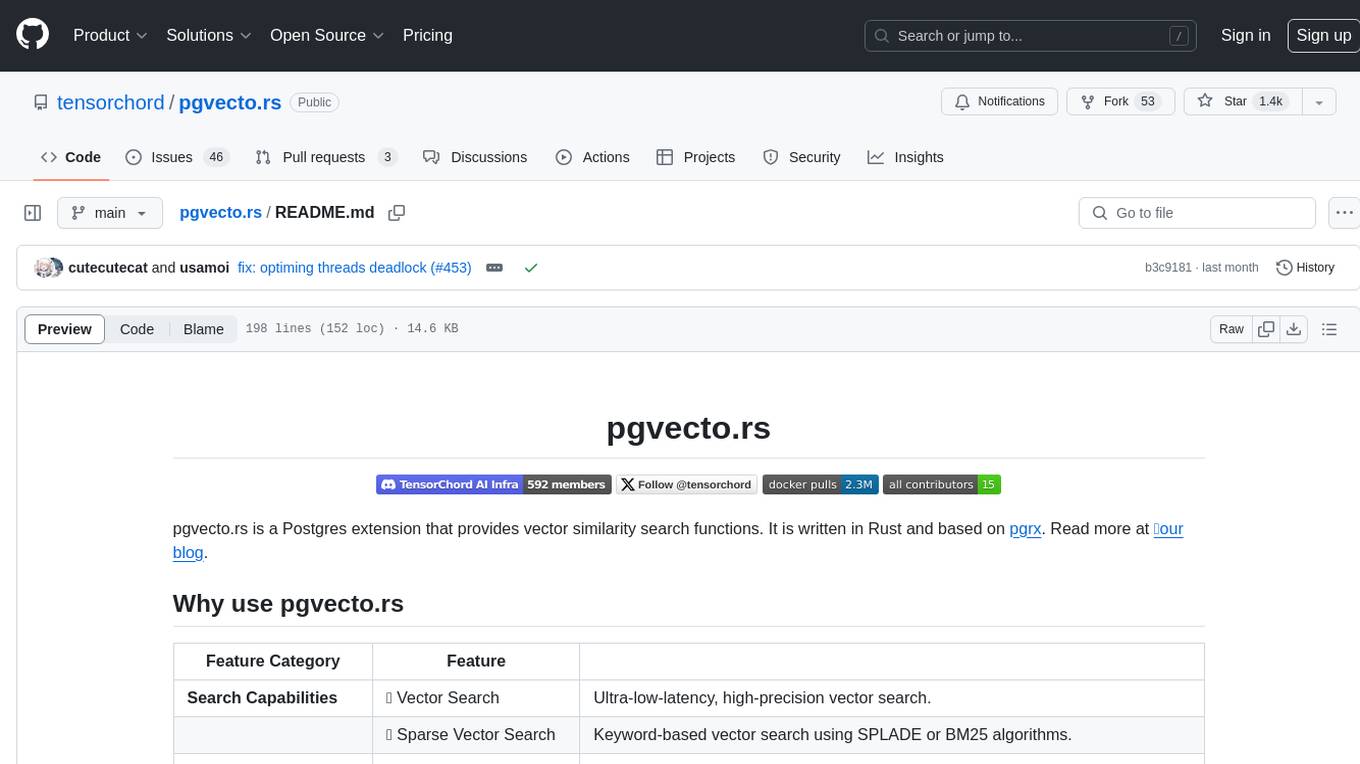
pgvecto.rs
pgvecto.rs is a Postgres extension written in Rust that provides vector similarity search functions. It offers ultra-low-latency, high-precision vector search capabilities, including sparse vector search and full-text search. With complete SQL support, async indexing, and easy data management, it simplifies data handling. The extension supports various data types like FP16/INT8, binary vectors, and Matryoshka embeddings. It ensures system performance with production-ready features, high availability, and resource efficiency. Security and permissions are managed through easy access control. The tool allows users to create tables with vector columns, insert vector data, and calculate distances between vectors using different operators. It also supports half-precision floating-point numbers for better performance and memory usage optimization.
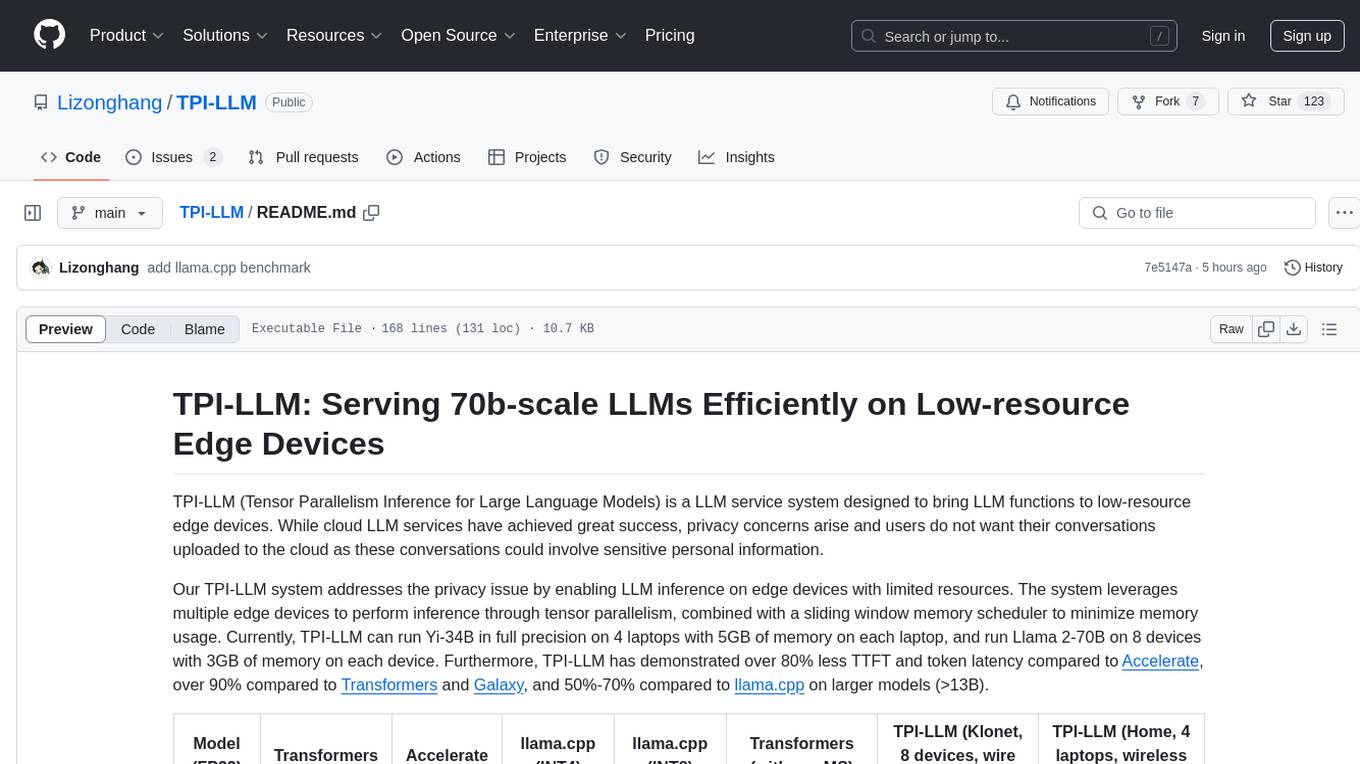
TPI-LLM
TPI-LLM (Tensor Parallelism Inference for Large Language Models) is a system designed to bring LLM functions to low-resource edge devices, addressing privacy concerns by enabling LLM inference on edge devices with limited resources. It leverages multiple edge devices for inference through tensor parallelism and a sliding window memory scheduler to minimize memory usage. TPI-LLM demonstrates significant improvements in TTFT and token latency compared to other models, and plans to support infinitely large models with low token latency in the future.
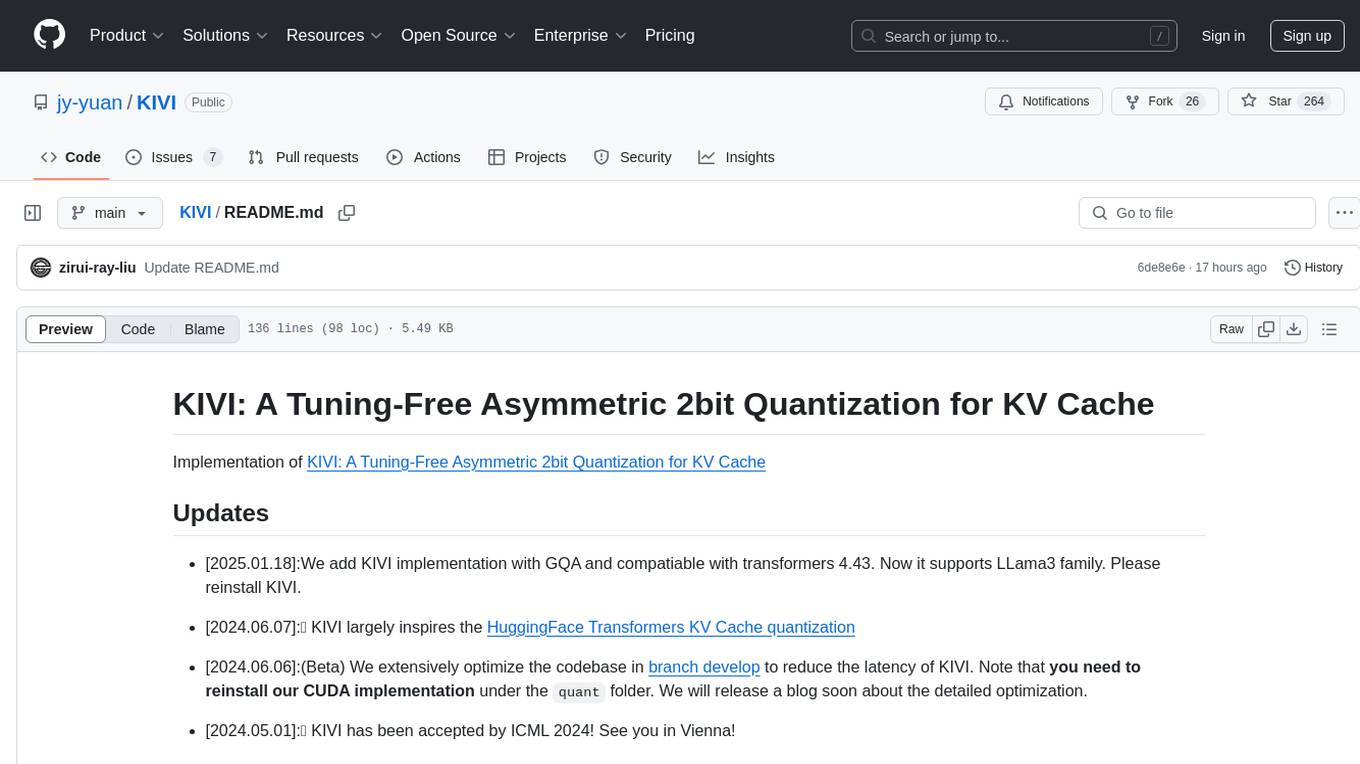
KIVI
KIVI is a plug-and-play 2bit KV cache quantization algorithm optimizing memory usage by quantizing key cache per-channel and value cache per-token to 2bit. It enables LLMs to maintain quality while reducing memory usage, allowing larger batch sizes and increasing throughput in real LLM inference workloads.
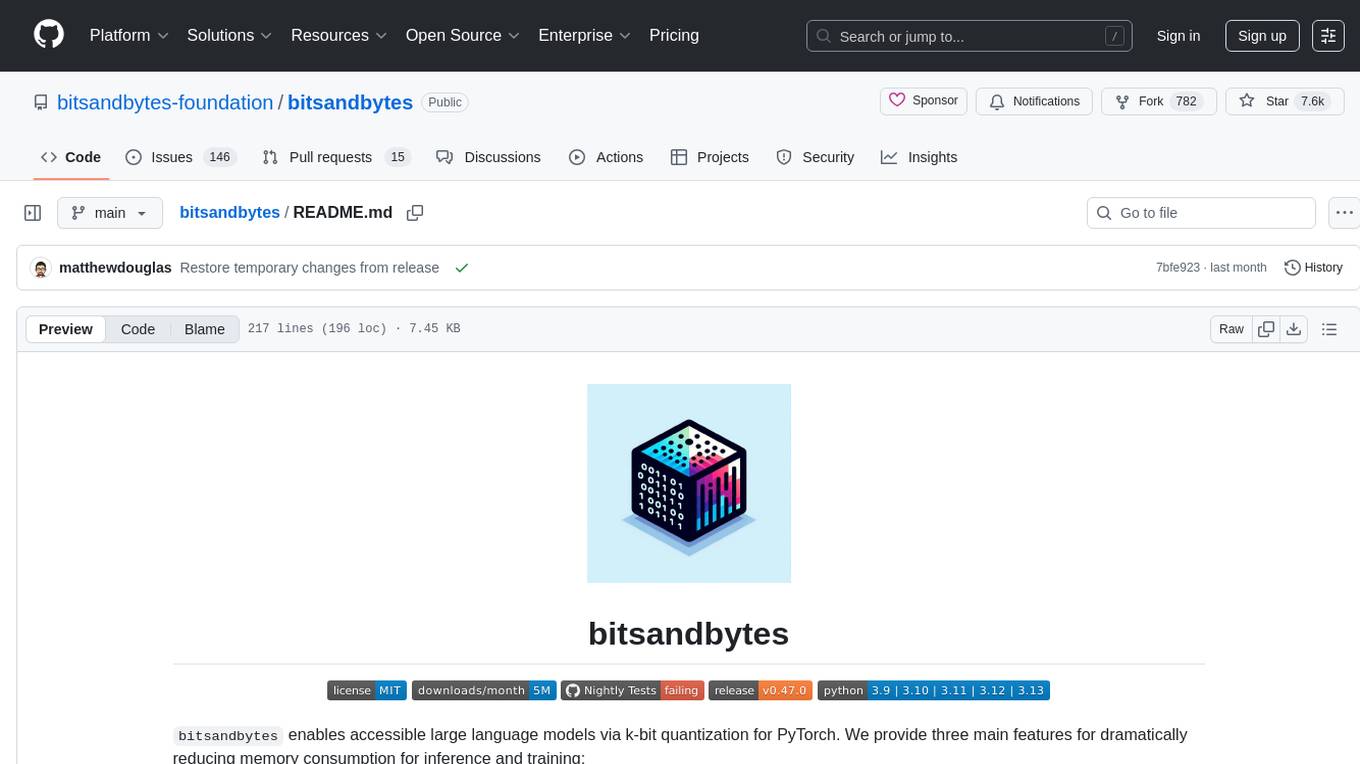
bitsandbytes
bitsandbytes enables accessible large language models via k-bit quantization for PyTorch. It provides features for reducing memory consumption for inference and training by using 8-bit optimizers, LLM.int8() for large language model inference, and QLoRA for large language model training. The library includes quantization primitives for 8-bit & 4-bit operations and 8-bit optimizers.
For similar jobs

lollms-webui
LoLLMs WebUI (Lord of Large Language Multimodal Systems: One tool to rule them all) is a user-friendly interface to access and utilize various LLM (Large Language Models) and other AI models for a wide range of tasks. With over 500 AI expert conditionings across diverse domains and more than 2500 fine tuned models over multiple domains, LoLLMs WebUI provides an immediate resource for any problem, from car repair to coding assistance, legal matters, medical diagnosis, entertainment, and more. The easy-to-use UI with light and dark mode options, integration with GitHub repository, support for different personalities, and features like thumb up/down rating, copy, edit, and remove messages, local database storage, search, export, and delete multiple discussions, make LoLLMs WebUI a powerful and versatile tool.

Azure-Analytics-and-AI-Engagement
The Azure-Analytics-and-AI-Engagement repository provides packaged Industry Scenario DREAM Demos with ARM templates (Containing a demo web application, Power BI reports, Synapse resources, AML Notebooks etc.) that can be deployed in a customer’s subscription using the CAPE tool within a matter of few hours. Partners can also deploy DREAM Demos in their own subscriptions using DPoC.

minio
MinIO is a High Performance Object Storage released under GNU Affero General Public License v3.0. It is API compatible with Amazon S3 cloud storage service. Use MinIO to build high performance infrastructure for machine learning, analytics and application data workloads.

mage-ai
Mage is an open-source data pipeline tool for transforming and integrating data. It offers an easy developer experience, engineering best practices built-in, and data as a first-class citizen. Mage makes it easy to build, preview, and launch data pipelines, and provides observability and scaling capabilities. It supports data integrations, streaming pipelines, and dbt integration.

AiTreasureBox
AiTreasureBox is a versatile AI tool that provides a collection of pre-trained models and algorithms for various machine learning tasks. It simplifies the process of implementing AI solutions by offering ready-to-use components that can be easily integrated into projects. With AiTreasureBox, users can quickly prototype and deploy AI applications without the need for extensive knowledge in machine learning or deep learning. The tool covers a wide range of tasks such as image classification, text generation, sentiment analysis, object detection, and more. It is designed to be user-friendly and accessible to both beginners and experienced developers, making AI development more efficient and accessible to a wider audience.

tidb
TiDB is an open-source distributed SQL database that supports Hybrid Transactional and Analytical Processing (HTAP) workloads. It is MySQL compatible and features horizontal scalability, strong consistency, and high availability.

airbyte
Airbyte is an open-source data integration platform that makes it easy to move data from any source to any destination. With Airbyte, you can build and manage data pipelines without writing any code. Airbyte provides a library of pre-built connectors that make it easy to connect to popular data sources and destinations. You can also create your own connectors using Airbyte's no-code Connector Builder or low-code CDK. Airbyte is used by data engineers and analysts at companies of all sizes to build and manage their data pipelines.

labelbox-python
Labelbox is a data-centric AI platform for enterprises to develop, optimize, and use AI to solve problems and power new products and services. Enterprises use Labelbox to curate data, generate high-quality human feedback data for computer vision and LLMs, evaluate model performance, and automate tasks by combining AI and human-centric workflows. The academic & research community uses Labelbox for cutting-edge AI research.






